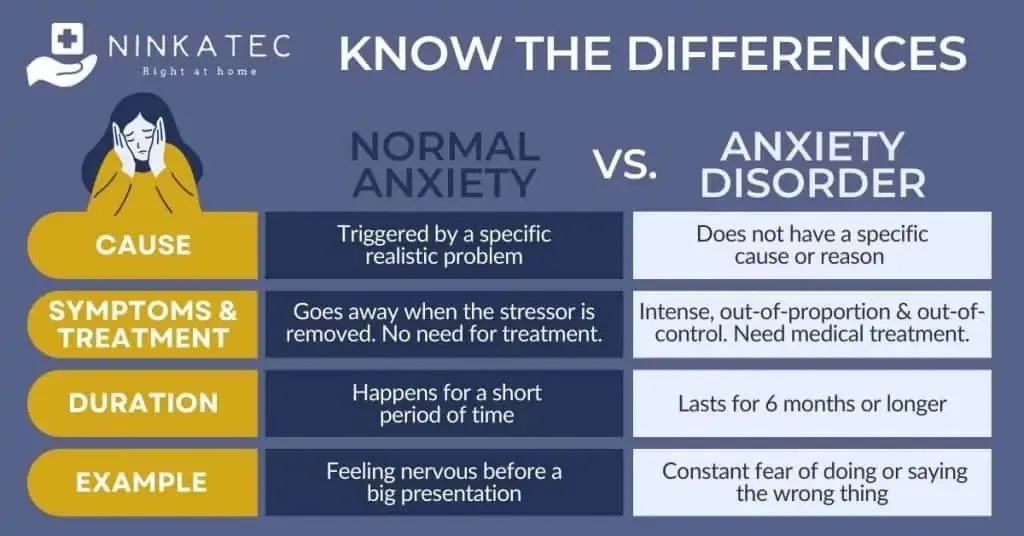Anxiety is something we all feel sometimes. Like when we have to talk in front of a bunch of people or drive in really busy traffic. It can make us a little nervous, but that's okay because it helps us get ready and be careful.
But sometimes, this nervous feeling becomes too much. It's like a big, scary wave that stops us from doing normal things like going to school or work. When this happens, it might be because of something called an 'anxiety disorder.
 |
| Source: https://ninkatec.com/anxiety-disorder-and-psychological-physical-consequences/#3_Differentiating_Regular_Anxiety_with_Anxiety_Disorder |
What is anxiety?
According to American Psychiatric Association, anxiety is a normal reaction to stress. Anxiety is a normal and adaptive response to stress and potentially threatening situations. It serves as a built-in survival mechanism that helps humans respond to challenges and danger.
Anxiety refers to anticipation of a future concern and is more associated with muscle tension and avoidance behavior. Fear is an emotional response to an immediate threat and is more associated with a fight or flight reaction – either staying to fight or leaving to escape danger.
When faced with a perceived threat, the body's "fight or flight" response is activated, which includes increased heart rate, rapid breathing, heightened alertness, and other physiological changes aimed at preparing the body to deal with the threat.
This acute anxiety response can be beneficial in many situations. For example, feeling anxious before an important exam or presentation can enhance focus and performance. They affected nearly 30% of adults at some point in their lives.
What are Anxiety Disorders?
Anxiety disorders differ from normal feelings of nervousness or anxiousness and involve excessive fear or anxiety. Anxiety disorders are the most common of mental disorders.
Problems arise when anxiety becomes chronic, excessive, or disproportionate to the situation.
In anxiety disorders, the body's stress response is triggered even when there is no immediate threat or when the level of anxiety is out of proportion to the situation.
This chronic and excessive anxiety can interfere with daily life, relationships, and overall well-being, and it often requires intervention and treatment.
Anxiety disorders can cause people to try to avoid situations that trigger or worsen their symptoms. Job performance, schoolwork and personal relationships can be affected.
In general, for a person to be diagnosed with an anxiety disorder, the fear or anxiety must:
- Be out of proportion to the situation or be age-inappropriate
- Hinder their ability to function normally
So, while anxiety is a normal and necessary part of the human experience, it can become a problem when it is no longer adaptive and starts to impair a person's functioning and quality of life.
People typically experience one or more of the following symptoms:
Emotional symptoms:
- Feelings of apprehension or dread
- Feeling tense or jumpy
- Restlessness or irritability
- Anticipating the worst and being watchful for signs of danger
- Pounding or racing heart and shortness of breath
- Sweating, tremors and twitches
- Headaches, fatigue and insomnia
- Upset stomach, frequent urination or diarrhea
When this happens, seeking help from mental health professionals can be beneficial in managing and addressing anxiety-related issues.
Many of us have experienced stress, anxiety, or depression. For some, those feelings can grow so serious that it’s difficult to connect with the help you need. Seeking professional help can be daunting just to think about, let alone act on. What many don’t realize is that helplines can be a great option for support in an intense moment, and a critical way to stay safe.
To that end, HelpGuide created a resource, What to Expect When Calling a Helpline, that covers:
To that end, HelpGuide created a resource, What to Expect When Calling a Helpline, that covers:
- Helpline options and how to choose
- What to expect when you call a helpline
- Common concerns that keep people from calling
- When to seek other mental health resources
References
- American Psychiatric Association. (2022). Anxiety Disorders. In Diagnostic and Statistical Manual of Mental Disorders (5th ed. Text Revision) (pp. 215-231). Retrieved September 13, 2023, from https://www.psychiatry.org/patients-families/anxiety-disorders/what-are-anxiety-disorders
- National Alliance on Mental Illness (NAMI). (2017, December). Anxiety Disorders. Retrieved September 13, 2023, from https://www.nami.org/About-Mental-Illness/Mental-Health-Conditions/Anxiety-Disorders













Oh ic the differences 👍. Saya pun kadang kalau harus berhadapan dengan orang banyak, pasti nervous juga. Tapi tak sampailah jadi Tremor atau masuk kategori anxiety disorder. Memang kalo dah tahap itu, sebaiknya consult dengan para expert.
BalasPadamTerima kasih kerana singgah ke Blog Sii Nurul. Jika ada sebarang pertanyaan, komen, penambahbaikan, cadangan mahupun pandangan. Boleh tinggalkan jejak anda.